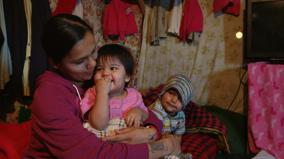The Story of the Coast Salish Knitters
For almost a century, the Coast Salish knitters of southern Vancouver Island have produced Cowichan sweaters from handspun wool. These distinctive sweaters are known and loved around the world, but the Indigenous women who make them remain largely invisible. Combining rare archival footage with the voices of three generations of woolworkers, The Story of the Coast Salish Knitters tells the tale of unsung heroines--resourceful women who knit to put food on the table and keep their families alive. Written and directed by Métis filmmaker Christine Welsh, this is a story of courage and cultural transformation--a celebration of the threads that …

Details
-
writerChristine Welsh
-
directorChristine Welsh
-
producerChristine WelshColleen CraigGillian Darling Kovanic
-
executive producerIan HerringGraydon McCrea
-
original story conceptSylvia Olsen
-
researchSylvia Olsen
-
director of photographyRandy Woolgar
-
editorBarton Hewett
-
location soundBarton Hewett
-
original musicBruce Ruddell
-
traditional musicGus JoeMary Ellen Joe
-
music producerPaul Brosseau
-
music recordingPaul Brosseau
-
audio post-productionTony MoskalKirby Walker
-
online editorSteve Brooks
-
on-line facilityStar Film & Video Inc.
-
production managerSher Morgan
-
post supervisorSher Morgan
-
production co-ordinatorColleen Craig
-
consultantDelmar Johnnie
-
archival film researchSher Morgan
-
title sequenceAcumen Art Services
-
photo album sequenceJudy Somers
-
additional photographyDavid Malysheff
-
gripSherry Antonishen
-
gafferSherry Antonishen
-
stills photographyColleen ToohyCathie Ferguson
-
additional stills researchKrista Pollard
-
production accountingAndrea DroegeFrances O'Donovan
-
transcriptionLori Isaac
-
associate producerColleen Craig
Education
Pedagogical evaluations and study guides are only available to CAMPUS subscribers.
CAMPUS
Features designed specifically for teachers. Learn more
Already subscribed? Sign in











